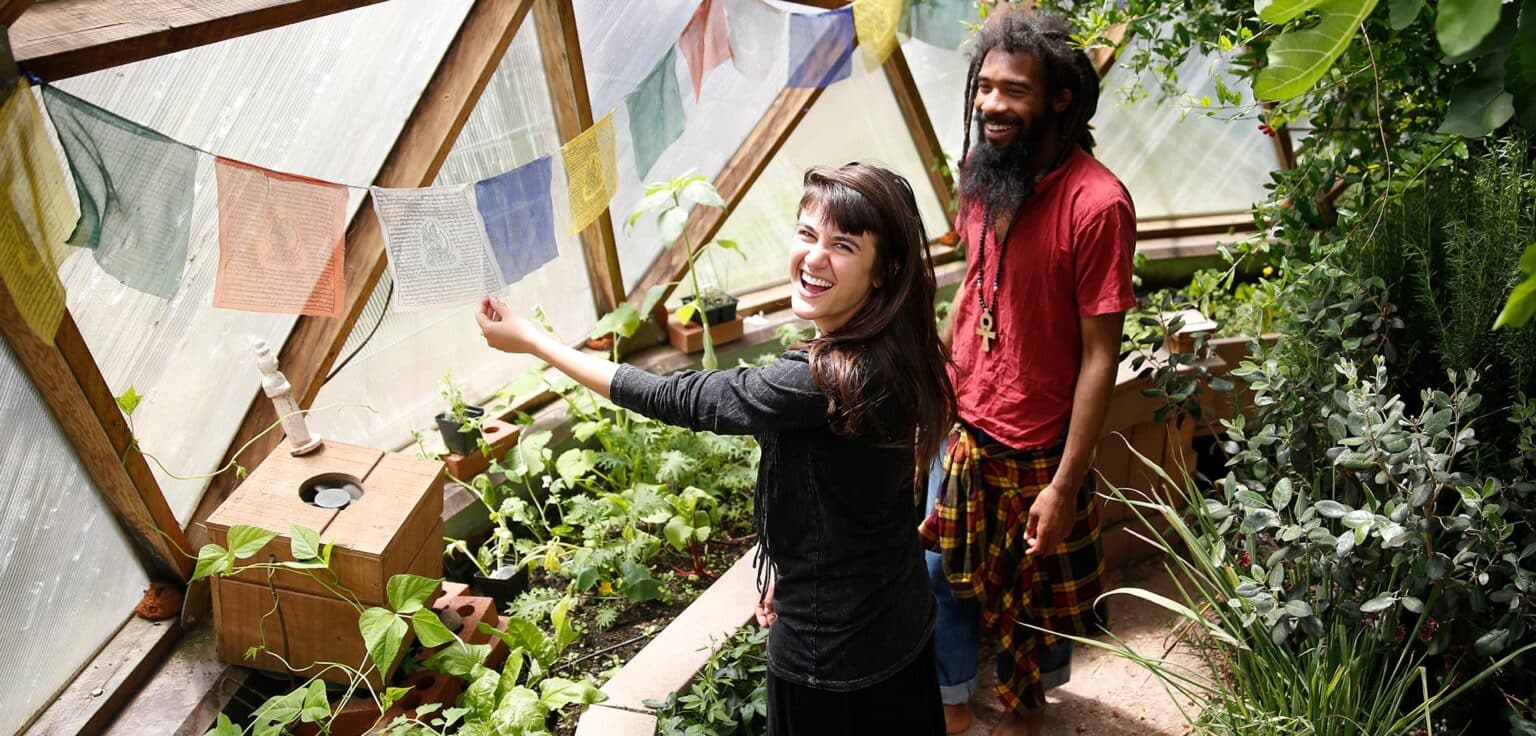BA in Environmental Studies
Bachelor of Arts in Environmental Studies
Program Overview
Naropa’s environmental studies program combines Western-based natural and social sciences with elements of contemplative education, social justice, and world wisdom traditions. This transdisciplinary approach empowers students by equipping them with a comprehensive knowledge base and skill set for tackling complex environmental issues.
Through this BA in Environmental Studies, students will gain a deep understanding of the living world through studying science, systems, sacred ecology, historical and contemporary environmental movements, diverse perspectives and wisdom, and contemplation, as well as engaging in hands-on, community-based work.
Diverse Knowledge
The BA in Environmental Studies program combines different courses with a contemplative approach and different insights. You will gain knowledge of food policy, practice nature-based awareness, and even learn skills for surviving in the wilderness.
Contemplative Approach
Naropa’s BA in environmental studies stands out due to its contemplative approach. Fostering a personal bond with nature becomes essential in leading communities and societies toward a deeper connection with the environment.
Experiential Learning
Naropa’s environmental studies program goes beyond conventional classroom instruction, providing opportunities to learn permaculture, survival skills, and field ecology along with participating in a contemplative nature retreat.
Quick Facts
- On-campus Degree
- 39 credit Hours
- Experiential Learning
- Combine any 12 ENV credits to complete a minor.
- 2 scholarships awarded to Outstanding Environmental Studies Undergrads
- Admissions open for 2024
Program Format
Naropa University’s undergraduate program is a four-year, fully accredited Bachelor of Arts degree program. The BA in Environmental Studies is a 39-credit major designed to empower students to develop the knowledge base and skill set needed to address complex environmental issues.
Within the Environmental Studies curriculum, students delve into the intricate connections between the natural world, human culture, and individual experiences. The program examines these connections through five intertwined themes: field science, sacred ecology, sustainability, permaculture, and the history and justice of the environment.

Course Spotlight
Permaculture Design
Degree
Requirements
A Bachelor of Arts degree (120 credits) consists of a Core Curriculum (30 credits) and at least one major, as well as minors and/or elective courses of the student’s choosing.
The Environmental Studies Major involves a total of 39 credit hours.
Environmental Studies Major Requirements
Required Courses: 15 Credits
ENV370, Environmental Philiosophy & Ecopsychology (3)
ENV411, Science for Sustainability (3)
ENV350, Nature, the Sacred, and Contemplation (3)
ENV401, Environmental Leadership Skills (3)
ENV355 Environmental Justice (3)
Action: Choose 3 Credits
ENV215, Sustainability (3)
ENV223, Field Ecology (3)
ENV238, Survival Skills (3)
ENV260, Introduction to Permaculture (3)
ENV341, Contemporary Environmental Movements (3)
ENV342, Permaculture Design (3)
ENV490, Special Topics: Activism (3)
Contemplative: Choose 3 Credits
ENV361, Spiritual Ecology (3)
ENV490, Special Topics: Contemplative (3)
Theory: Choose 3 Credits
ENV100, Earth Systems, Cosmology, and Gaia Theory (3)
ENV207, History of the Environmental Movement (3)
ENV253, Solidarity Economies (3)
ENV490, Special Topics: Theory (3)
Electives
Choose 6 Credits (from any of the courses listed above or below)
PAX335, Socially Engaged Spirituality (3)
REL351, Theories of Alternative Spiritualities & New Religious Movements (3)
ART355, Eco-Art (3)
REL250, Spirituality & Creative Expression (3)
ART200, The Contemplative Artist (3)
COR130, Roots & Branches (3)
REL160, Meditation Practicum I (3)
REL346, Wisdom & Compassion (3)
TRA120, Ikebana/Kado (3)
TRA133, Yoga I: Foundations (3)
COR150, Diversity Seminar (3)
INTD310, Feminist & Queet Theory Methods of Inquiry (3)
PAX250, Intro to Peace & Conflict (3)
PAX340, Conflict Transformation (3)
WRI210, Experimental/Activist Lit (3)
EDU300, Nature & Education (3)
COR222, Sustainability Seminar (3)
PSYB208, Embodying Process & the Individual (3)
PSYB209, Herbal Medicine (3)
PSYB329, Approaches to Healing (3)
PSYB354, Transpersonal Psychology (3)
Capstone: 6 Credits
COL450, Internship (3)
COR440, Capstone II (3)
Why Choose Naropa?
Green Campus & Nature
When you major in environmental studies at Naropa, your education will take you beyond the classroom. Students are required to actively engage in the university community and beyond, exploring Naropa’s green campus, hiking the Colorado outdoors, and engaging with the local sustainability community.
Sustainability Community
At Naropa, you will find a like-minded community of peers and faculty as you dig into an undergraduate environmental studies curriculum rich with sacred ecology, contemplation, and community action. Ecology conversations, events, and earth-centered experiences abound in Naropa’s community.
Unique Methodology
Students who crave a deeper connection with nature and want to learn more about the natural sciences have found the right place. You'll explore environmental challenges through the perspectives of social justice, politics, community dynamics, and introspection.

How this Program Prepares You
Internship and Senior Project
The Environmental Studies program collaborates with community organizations, enabling students to secure internships and create independent study opportunities that enhance the curriculum. BA majors must undertake a senior project in their final year, which can be a traditional thesis or a community-based initiative, fulfilled through ENV480, Senior Project.
Environmental Perspective
Upon completing the BA in environmental studies, graduates gain a comprehensive perspective on environmental issues, viewing them through the prisms of social justice, politics, community dynamics, and personal reflection. This journey enhances their understanding of the natural sciences and fosters a profound bond with nature.
Environmental Engagement
Naropa’s environmental studies major pushes learning outside traditional classrooms, urging students to immerse themselves in both the university community and wider environments. Within a learning lab like the Williams D. Jones Community Greenhouse, students encounter firsthand applications of permaculture principles on campus.
What You'll Learn
Contemplative
Obtain both physical and mental techniques to manage climate-related distress and worry, readying yourself for future uncertainties. Participate in nature-focused reflective exercises to deepen your bond with the wider environment.
Action
Participate in activities and acquire abilities that enhance both internal and external capabilities needed for responsible involvement in various environments.
Theory
Demonstrate knowledge and application of environmental theories and concepts
Justice
Investigate how environmental crises affect marginalized communities and articulate strategies that prioritize these communities in addressing injustices.
Ecology & Climate Change
Show understanding of ecological principles and practical, applied skills.
Career Opportunities with a Degree in Environmental Studies
After obtaining a degree in environmental studies from Naropa, graduates are well-equipped to explore diverse career avenues that align with their expertise and abilities. Opportunities abound, including roles as holistic health practitioners, organic farmers, environmental educators, landscapers, stormwater coordinators in local government, wilderness guides, and many other professions.
- Forester: manage forests and oversee planning and ecological assessments.
- Environmental Restoration Planner: improve ecosystems and environmental health.
- Recycling Coordinator: oversee and promote efficient recycling programs.
- Conservation Scientist: protect ecosystems with sustainable practices.
- Climate Change Policy Analyst: develop strategies to address climate change.
- Natural Sciences Manager: lead scientific research projects.
- Fish and Game Warden: enforce hunting and fishing laws, protecting wildlife.
- Chief Sustainability Officer: drive environmentally responsible practices in organizations.
FAQs About the
Environmental Studies
What is the difference between a BS and a BA in environmental studies?
The difference between a Bachelor of Science (BS) and a Bachelor of Arts (BA) in environmental studies primarily lies in their academic focuses and curricular structures.
A BS program typically places a stronger emphasis on the scientific and technical aspects of environmental studies. A BA program in environmental studies often adopts a more interdisciplinary approach, blending natural sciences with social sciences, humanities, and policy studies.
What is the difference between environmental studies and environmental science?
What can you do with an environmental studies degree?
What sets Naropa’s BA in environmental studies apart from other programs?
Learn More About the Program

Connect
with your counselor
Rachel Thompson
Assistant Director of Undergraduate Admissions
Prospective students with last names A-G
- 303-970-9831
- rachel.thompson@naropa.edu
- Schedule Appointment

Connect
with your counselor
Jenna Priest
Prospective students last names H-Z
Ready to Apply?
Admission Requirements
Naropa University places a high emphasis on academic excellence and the commitment to introspective exploration.
Learn more about admission requirements and the application process for undergraduate students.
Undergraduate Students
Students with a 3.0 GPA or Higher
Applicants with excellent academic performance are welcome with minimal requirements.
Students with Less than 3.0 GPA
If your academic record hasn’t been the strongest, but you wish to apply to Naropa, we strongly encourage you to submit your application. Contemplative practice matters to us just as much as academic excellence.
Apply as a transfer student
Present an official college transcript on top of your application to apply to Naropa as a transfer student, and transfer 60 or more transferable credits.
Discover all requirements for first-time and transfer students at our admission requirements page.
International Students
Our university values inclusivity and celebrates different cultures. We know that having a mix of people makes our community strong, and we’re excited to hear the unique ideas each student will bring to our active and energetic campus.
Learn more about applying to Naropa as an international student.
Costs and Financial Aid
Naropa prioritizes making education accessible to a wide array of students. Explore our page on undergraduate expenses and financial support to have insights on tuition, scholarships, grants, and other available resources.
You can use our cost calculator to estimate your potential costs at Naropa.
Undergraduate Scholarship Opportunities






